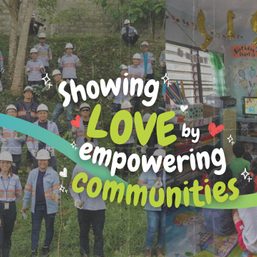SUMMARY
This is AI generated summarization, which may have errors. For context, always refer to the full article.
![[Good Business] Coalition of the willing](https://www.rappler.com/tachyon/2024/07/TL-Coalition-of-the-willing.jpg)
In one breakfast meeting with NGO leaders and business people, a head of an international NGO shared a model he learned from an executive course he took in Harvard University. This model challenges the long existing approach on development where plans and strategies are often based on available resources. This leader shared a bold statement that our traditional approach in planning and strategy is the core reason why we have not made significant dents in the societal problems we all wanted to solve.
The Model
The model challenges development workers to start with identifying and articulating their passion. The passion must determine the problem that the organization would like to focus on and in which universe, whether its own locality, country, or even globally. This process then allows for the organization to have a better understanding of how big the problem is and determine what are the critical data points to consider.
Once the passion is clearly articulated, the next step is to build a strategy. But the strategy is not according to how much resource does the organization have, but on how much is actually needed to solve the problem within the identified universe. Now that seems too ambitious and definitely impossible for a singular organization to do. Not even government institutions or international organizations have the capacity to do it on their own. However, that is the unique proposition of the model. It promotes focus on the problem and understanding of its scope. This will allow the said organization to identify where it is most impactful in solving the problem. But more than that, a strategy that looks at the entire universe of one particular problem will help determine how much is actually needed to solve the said problem. Though not one singular organization can solve it, through this model, a culture of networking and sharing of resources can be done in the most efficient way.
Finally, the model dictates that with the right strategy, resources will follow.
In summary, the model tells us that for us to effectively solve societal problems, we need to start with identifying a passion. From that passion, we should build a strategy that solves the problem for the entire identified universe. With the right strategy, resources should follow.
Application of the model
To put it simply, what the model aims to happen is for organizations to focus on solving one problem for all people concerned. Now that seems to be too ambitious and nearly impossible, but if we look at existing efforts that give a semblance of what the model promotes, it shows it is effective and it can be done.
One famous example of this model is the Global Polio Eradication Initiative (GPEI). This worldwide effort was embraced as a clear mission by a socio-civic organization like Rotary Club and a philanthropic foundation like Bill and Melinda Gates Foundation. From the time the initiative was started in 1988, it has resulted in a 99% decrease in the cases of polio worldwide. (Source: https://www.gatesfoundation.org/our-work/programs/global-development/polio)
Though the problem that GPEI wanted to solve was overwhelming, the concerted efforts of many different moving parts allowed for significant progress to take place.
The real challenge
Many organizations, whether in business or in civil society, are without a doubt doing amazing and impactful activities – be it through their own social responsibility efforts, compliance with regulations, or provision of products or services that impacts society. The real challenge, however, is how these private organizations can work together so that each one embraces a niche in the bigger problem and harmoniously complement and contribute in solving critical problems.
Businesses and organizations in the Philippines must exert more effort to extend its networking and dialogue to the level where real work is delegated and accomplished. Though businesses by its nature are supposed to be in competition, our long standing problems as a society calls for us to sit at the same table to share notes.
We must create a space where like-minded people from business, non-profit, academe, government, media, and church can come together to build a coalition of the willing. A coalition that identifies a passion that will be its north star. Such a coalition must go through the rigorous process of developing a strategy that solves the problem for the entire country. And as the coalition agrees on a strategy, each must reach into their pockets and efficiently put together resources to solve the problem once and for all. – Rappler
Reigner Sanchez is an advocate of human rights, social justice and economic empowerment. He manages a Non-Profit Microfinance that deals with the least served sectors. Back in college, he was a recipient of two awards namely: Community Leadership Award and Student Leadership Award from De La Salle University where he finished Bachelor of Secondary Education, major in English. In 2018, he passed the Licensure Examinations for Teachers. He took up units of Master in Public Management with the Ateneo School of Government. reignermsanchez@gmail.com
Add a comment
How does this make you feel?
![[Good Business] Redefining success, guided by values](https://www.rappler.com/tachyon/2024/06/TL-Philippines-business-La-Salle-june-12-2024.jpg?fit=449%2C449)








There are no comments yet. Add your comment to start the conversation.